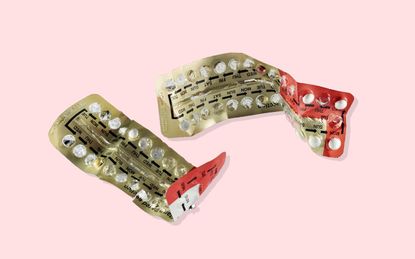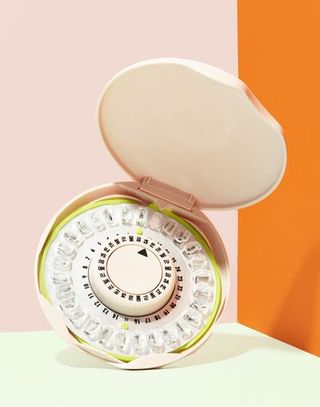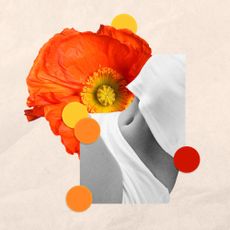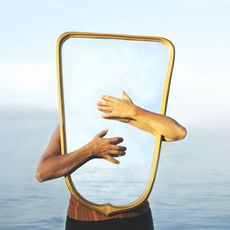

The idea of getting off the pill once you've gotten used to a daily alarm schedule and a lighter period can feel like losing a familiar friend. And it might raise more than a few questions about your post-pill lifestyle, like: How will I feel afterwards? Will my skin ever be this clear again? Will I be an emotional monster? Will my periods be as terrible as I remembered?
Turns out, the best predictor of how your body will change after stopping the pill, according to Dr. Lauren Streicher—an Associate Clinical Professor of Obstetrics and Gynecology at Northwestern University's Feinberg School of Medicine—is how your body acted beforehand. So, if you were experiencing nightmare periods and symptoms like bad cramps, PMS, and headaches prior to starting hormones, she says chances are the same will kick in when you're off the pill. Oof. Similarly, bad acne and period-related mood swings are likely to come back if you experienced a temporary grace period when you were on the pill. The reason behind this is that your body maintains a stable level of daily hormones—estrogen and progesterone—when you're on the pill, she says, and starts to cycle again when you stop taking them.

As for how long it takes for your period to return to normal? According to Streicher, it's highly variable. "Some women will go off the pill, and then they might get their regular spontaneous period a month later or not. Sometimes it's going to take a few months until things click in." And unless you're trying to get pregnant, it's important to take up other methods of birth control once you stop using the pill. Most women typically start to ovulate again within one to two months after they stop taking the pill, but it's possible to get pregnant immediately after.
Another important factor to note is that the effects of ditching the pill can differ from someone who's around the age of 25 or 30 and another woman who's pre-menopausal. Streicher says that the pill could be masking a host of menopause symptoms like hot flashes, so women should be prepared to deal with big physical changes after stopping the pill.
"And I think there's still this notion floating around that you should go off the pill periodically to give your body a rest. There's no science behind that," says Streicher. Unless you have a personal or medical reason to get off the pill, such as a risk of blood clots or an estrogen-dependent cancer like breast cancer, she says there's no reason to stop taking the pill if you're doing well "just because."
"There's still this notion floating around that you should go off the pill periodically to give your body a rest. There's no science behind that."
In fact, she notes that there are a long list of health benefits to staying on the pill long-term, such as a reduced risk of uterine cancer and ovarian cancer, plus endometriosis and anemia. So until you start considering other options, there are plenty of reasons to keep enjoying life on the pill.
Follow Marie Claire on Facebook for the latest celeb news, beauty tips, fascinating reads, livestream video, and more.
Stay In The Know
Marie Claire email subscribers get intel on fashion and beauty trends, hot-off-the-press celebrity news, and more. Sign up here.
-
 Olivia Rodrigo Finds the Perfect Spring Dresses at Reformation
Olivia Rodrigo Finds the Perfect Spring Dresses at ReformationShe's worn the brand twice in the past week.
By Julia Marzovilla Published
-
 Curiously, Just as Meghan Markle Sends Samples of Her New Strawberry Jam Out, the Buckingham Palace Shop Starts Promoting Its Own Strawberry Jam on Social Media
Curiously, Just as Meghan Markle Sends Samples of Her New Strawberry Jam Out, the Buckingham Palace Shop Starts Promoting Its Own Strawberry Jam on Social MediaThe clip promoting the Buckingham Palace Shop’s product—we cannot make this up—is set to Mozart’s “Dissonance Quartet.”
By Rachel Burchfield Published
-
 Zendaya's Latest 'Challengers' Serve Is Nearly a Century Old
Zendaya's Latest 'Challengers' Serve Is Nearly a Century OldThe 1930s-era dress may have been pulled months ago.
By Halie LeSavage Published
-
 Senator Klobuchar: "Early Detection Saves Lives. It Saved Mine"
Senator Klobuchar: "Early Detection Saves Lives. It Saved Mine"Senator and breast cancer survivor Amy Klobuchar is encouraging women not to put off preventative care any longer.
By Senator Amy Klobuchar Published
-
 How Being a Plus-Size Nude Model Made Me Finally Love My Body
How Being a Plus-Size Nude Model Made Me Finally Love My BodyI'm plus size, but after I decided to pose nude for photos, I suddenly felt more body positive.
By Kelly Burch Published
-
 I'm an Egg Donor. Why Was It So Difficult for Me to Tell People That?
I'm an Egg Donor. Why Was It So Difficult for Me to Tell People That?Much like abortion, surrogacy, and IVF, becoming an egg donor was a reproductive choice that felt unfit for society’s standards of womanhood.
By Lauryn Chamberlain Published
-
 The 20 Best Probiotics to Keep Your Gut in Check
The 20 Best Probiotics to Keep Your Gut in CheckGut health = wealth.
By Julia Marzovilla Published
-
 Simone Biles Is Out of the Team Final at the Tokyo Olympics
Simone Biles Is Out of the Team Final at the Tokyo OlympicsShe withdrew from the event due to a medical issue, according to USA Gymnastics.
By Rachel Epstein Published
-
 The Truth About Thigh Gaps
The Truth About Thigh GapsWe're going to need you to stop right there.
By Kenny Thapoung Published
-
 3 Women On What It’s Like Living With An “Invisible” Condition
3 Women On What It’s Like Living With An “Invisible” ConditionDespite having no outward signs, they can be brutal on the body and the mind. Here’s how each woman deals with having illnesses others often don’t understand.
By Emily Shiffer Published
-
 The High Price of Living With Chronic Pain
The High Price of Living With Chronic PainThree women open up about how their conditions impact their bodies—and their wallets.
By Alice Oglethorpe Published